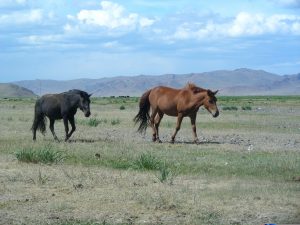On a dusty plain south of Uzakistan and east of Zebikistan, somewhere in Central Asia, Ugh and Argh are having a heated argument about whose horse was fastest. Ugh’s raggedy beard is bristling with anger, and he is waving a gnarled finger dangerously close to Argh’s one good eye. It’s circa 4,500 BC, and unbeknown to them they have just made history by being the first humans to sit on a horse for longer than a minute at a time. (Of course, they didn’t have watches, they just knew that the horses, who were running wild just a few days before, finally got tired of throwing them off.)
 The outcome? The horses had run out of tactics, so they were happy to go with the flow, even if it meant a sprint across the cold, wind-blown tundra. Record keeping in those days was rather patchy, but it seems that the race was won by Argh, who went on to become a professional jockey. Ugh retired from competitive racing and spent the rest of his days caring for his hyacinth garden. More importantly, according to a trustworthy source, the villagers were so excited by this breath-taking contest of speed and endurance that it became an annual fixture, much like today’s Hong Kong International Races. Of course, there are some differences between that race and the ones in Hong Kong. For starters, the world’s first race had just a few onlookers wrapped up in tatty yak furs standing around an improvised race track carved out of the dirt; today, tens of thousands of people sit in towering stands, roaring their support for a field of star-studded equine thoroughbreds as they thunder around immaculately landscaped courses.
The outcome? The horses had run out of tactics, so they were happy to go with the flow, even if it meant a sprint across the cold, wind-blown tundra. Record keeping in those days was rather patchy, but it seems that the race was won by Argh, who went on to become a professional jockey. Ugh retired from competitive racing and spent the rest of his days caring for his hyacinth garden. More importantly, according to a trustworthy source, the villagers were so excited by this breath-taking contest of speed and endurance that it became an annual fixture, much like today’s Hong Kong International Races. Of course, there are some differences between that race and the ones in Hong Kong. For starters, the world’s first race had just a few onlookers wrapped up in tatty yak furs standing around an improvised race track carved out of the dirt; today, tens of thousands of people sit in towering stands, roaring their support for a field of star-studded equine thoroughbreds as they thunder around immaculately landscaped courses.
Then there is the prize money, which in 4,500 BC was not an issue because there were no prizes or money. Today, horse racing purses are massive. In Hong Kong alone, just 83 yearly races generate a turnover of over $HK100 billion. More than two million people attend these races, and the huge sums of money wagered by them are having a profound effect on the wellbeing of the city’s citizens.
Here’s why: in Hong Kong, racing and betting is conducted by the Hong Kong Jockey Club, which holds a government-granted monopoly on horse races, football matches and lotteries. Through the HKJC, which is the territory’s largest taxpayer and charity, huge amounts of money are funnelled into civil projects, benefiting everyone from punters, owners and spectators to the government and the community at large.
When you join Motive Travel for one of the biggest events on the world’s horse racing calendar, the Hong Kong International Races, you will be enjoying the culmination of some 6,500 years of racing history, one which started in Central Asia and was adopted by ancient Greece and the Roman Empire before evolving into modern horse racing by the 12th century English knights who brought Arab stallions home from their travels.
Motive’s history is not quite as long, but over the last 30 years it’s built up an enviable reputation as a company which provides the best in travel experiences. And that comes from sources you can trust.
Get in touch with us today to secure your spot on our 2017 Hong Kong International Races tour!
(Please note, while early records indicate that horse racing may well have originated in Central Asia circa 4500 BC, the above account is a work of creativity. Names, characters, places, events and incidents are a product of our author’s imagination, which is quite vivid, but we hope you enjoyed his take on things. Any resemblance to actual persons, living or dead, or actual events is purely coincidental. Information provided on horse racing in Hong Kong, however, was correct at the time of writing.)
Online Enquiry Form
We welcome your enquiries. Please fill in the form below.
[contact-form-7 id=”7″ title=”Contact form 1″]
















